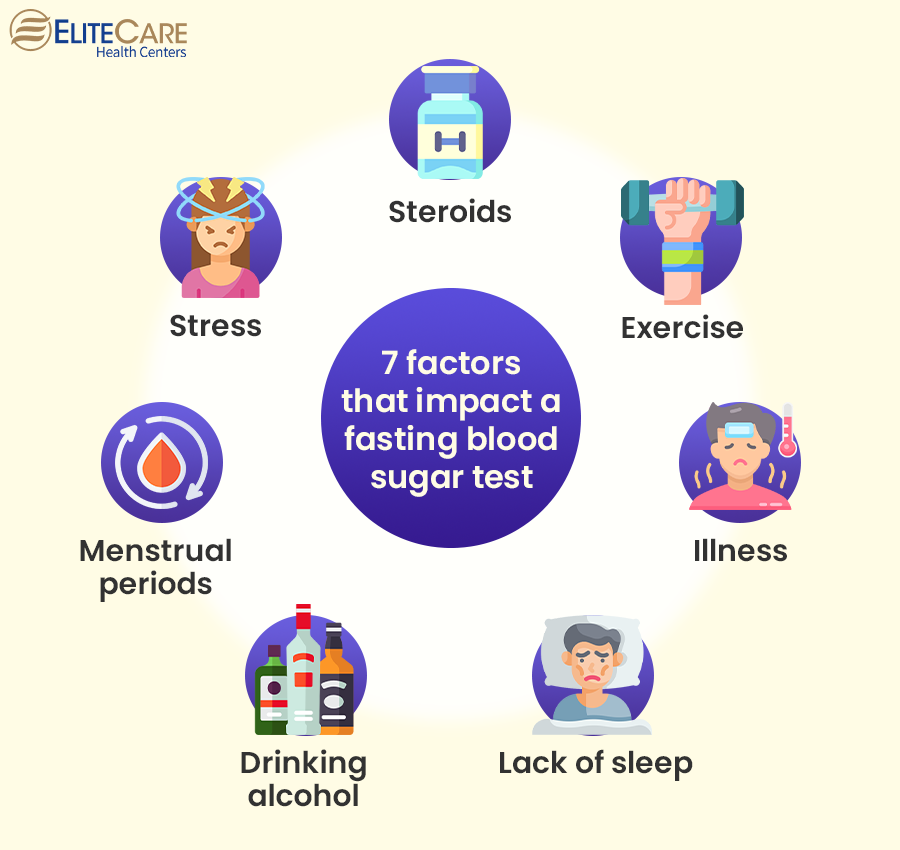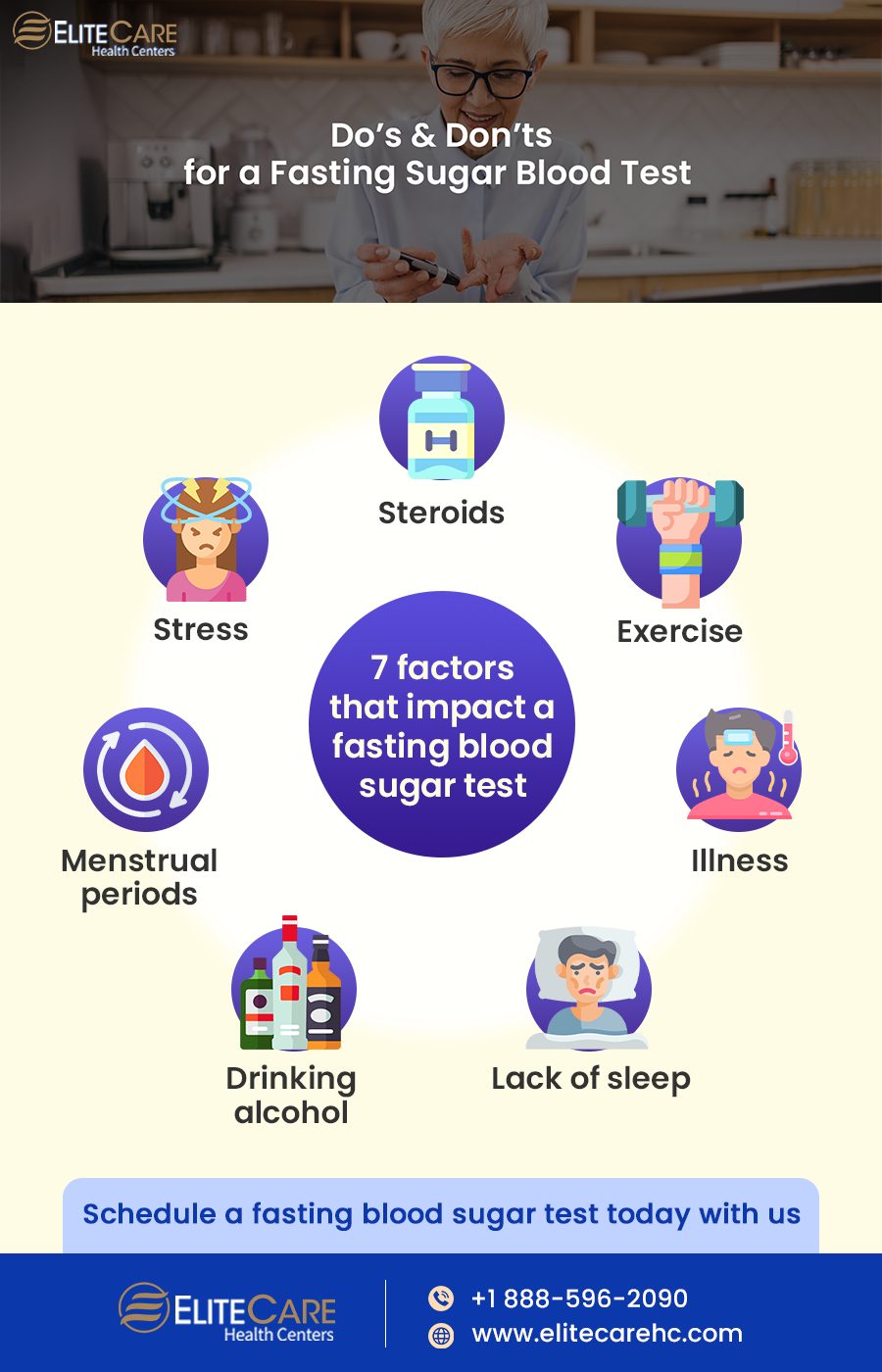
When we consume carbohydrates, our body turns them into glucose for energy that, in turn, fuels our lives. Blood glucose levels that are not within prescribed normal ranges – could indicate either pre-diabetes – or diabetes.To diagnose diabetes, a fasting blood sugar test is often performed. This type of blood sugar test involves obtaining a blood sample through a procedure called venipuncture after the individual has not eaten or consumed any fluids for a period of time. The blood sample is then sent to a laboratory for analysis, which can provide important information for the diagnosis and management of diabetes.
Hence a fasting blood sugar test is one of the most popular types of blood sugar testing, and it can provide information to better aid in the diagnosis of diabetes.
What is a fasting blood sugar test?
A fasting blood sugar test determines the glucose level (sugar) in the blood after fasting for at least 8-12 hours. One needs to avoid food or drink except for water during the fasting period. At the end of the fasting period, the existing level of glucose in the blood is measured after it has been absorbed by the cells in the body with the help of insulin produced by the pancreas after the last meal that was consumed.
A fasting blood sugar test is vital because it can detect elevated blood sugar levels or low blood sugar, regardless of what has been previously eaten.
A fasting blood sugar test can identify the following conditions:
- Prediabetes
- Type 1 diabetes
- Type 2 diabetes
- Gestational diabetes (that can occur during pregnancy)
A fasting blood sugar test can also help determine how well the diabetes management plan is functioning and whether there is a need to make any prescription changes. Before having any blood work done, discuss with your doctor how certain factors, such as the medications you take or your favorite meals, may affect the findings of the test. Here are a few factors to be aware of that impact fasting blood glucose.
Things that influence a fasting blood sugar test:

Blood sugar levels may be influenced by a variety of factors. It is vital to keep these factors in mind before getting a fasting blood sugar test.
1. Steroids
Corticosteroids, also known as steroids, are a class of drugs used to treat a wide range of diseases, including skin rashes, asthma, COPD (chronic obstructive pulmonary disease), arthritis, and other inflammatory conditions.
Steroids resemble the stress hormone cortisol. Cortisol causes an increase in blood sugar and blood pressure. Consuming steroids can cause the body to become insulin resistant over time, meaning your cells do not respond to the hormone insulin as they should. As a result, insulin resistance can develop, causing blood glucose levels to rise.
2. Exercise
Exercise impacts one’s blood sugar level if done right before the blood test. The blood glucose level rises immediately after exercise, and then falls up to 24 hours or more after the workout.
To ensure accurate results, avoid exercising the morning of the fasting blood sugar test. Exercising the day before your test should not affect the test results.
3. Illness
Blood sugar levels may be higher than normal when fighting an infection or sickness. Illnesses create stress in the body, causing blood sugar levels to rise.
However, a fasting blood sugar test while suffering from a minor sickness, such as a cold, is unlikely to have a significant impact on results. Consider rescheduling the blood test when suffering from a severe condition, such as an infection or the flu,
4. Lack of sleep
Sleep deprivation can lead to insulin resistance, which leads to elevated fasting blood sugar levels. A single bad night’s sleep will most likely not affect test results, but chronic sleep deprivation is associated with higher fasting blood glucose numbers.
5. Drinking alcohol
Alcohol consumption may impact the results and indicate lower blood sugar levels. This is because when your liver metabolizes alcohol, it does not produce glucose as it normally would with other food items, resulting in lower blood sugar levels.
Drinking alcohol before the test could result in low test result numbers – delaying the identification of prediabetes or diabetes. Thus, it’s better to avoid drinking the night before undergoing a fasting blood glucose test.
6. Menstrual periods
Numerous blood biomarkers like iron, and lipid might alter significantly depending on the menstrual cycle phase. And these phases can impact blood test results. In general, blood samples are best collected during the ‘first half of the cycle (the follicular phase), when normal and aberrant hormone levels are more identifiable.
7. Stress
During periods of stress, the body produces stress hormones such as cortisol and adrenaline. This provides more energy for a ‘”fight or flight response.” However, the hormones make it more difficult for insulin to perform effectively, which is a condition known as insulin resistance. When one does not get enough energy into the body’s cells, blood sugar levels rise.
Things to know before getting a blood test
Preparation for a fasting blood sugar test at your doctor’s office or clinic:
Step 1: Avoid eating or drinking anything other than water for 12 hours before your fasting blood glucose test. You should be able to continue taking your prescription medicines as usual but check with your healthcare professional to be sure.
Step 2: If possible, avoid exercising hours before the blood sugar test
Step 3: Attend your blood draw appointment and follow their directions for taking the blood sample. Depending on the facility, it will be done through a venous draw (taking a vial of blood from a vein in your arm) or a finger stick test.
Read More: Foods That Help Lower Blood Pressure
Summing up
People with and without diabetes should monitor their fasting blood glucose levels to track their blood sugar health and diabetes risk. A fasting blood sugar test should be performed at least once a year to screen for diabetes and as often as your healthcare professional suggests if you already have diabetes.






